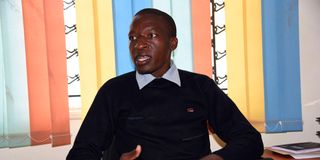Culture shift: Call to raise a generation of respectful men in war on GBV, femicide

Peter Kemei, the head of operations at the Men End FGM Foundation.
What you need to know:
- Kenya urged to tackle GBV and femicide by engaging men and boys in prevention, education, and positive masculinity promotion.
- Amid rising cases, lobby advocates push for reforms and male allyship to end harmful practices.
Of late, there has been a surge of gender-based violence and femicide in Kenya, with women being the main casualties. Men are the main perpetrators and intimate partners are blamed for the surge.
Players in the male engagement space are now calling for the involvement of men and boys in the fight against GBV and femicide. They are rooting for the amendment of the Sexual Offenses Act (2006) to tame the crisis.
The Men Engagement and Inclusion Gender Sector Working Group is pushing for the amendment to address men’s role in gender-based violence (GBV) prevention and response. The lobby wants the country to involve men and boys as partners or allies in the campaign.
In proposals to the Gender-Based Violence Prevention Taskforce currently undertaking public participation, the lobby also wants the government to implement competency-based education to include masculinity and GBV prevention topics. They recommend gender-responsive education in primary and secondary syllabuses, emphasising respect, consent, and non-violence.
The integration, modelled on the UN Women's HeForShe Campaign and enhanced enforcement of the Protection against Domestic Violence Act (2015), seeks to ensure swifter prosecution of perpetrators. The lobby has called for a national campaign against toxic masculinity, GBV myths, and male allyship targeting elders, imams, pastors, and chiefs to shift harmful beliefs that perpetuate GBV. They also want the support of grassroots male champions, boda boda riders, and youth groups to be amplified.
In addition, the lobby is rooting for safe spaces for men and boys by establishing counselling and dialogue centres for men struggling with mental health, trauma, and relationships. Faith Nashipae, a leading Men and Boychild champion, terms it critical to involve men and boys in enhancing positive masculinity and ending violence against women and girls. “Male engagement and inclusion is paramount if we want to achieve gender equality. It will present an opportunity to address social issues that disadvantage men, women, boys and girls.”
Faith, who also chairs the national committee on male engagement and inclusion, adds that engaging men and boys is a transformational approach to changing social norms and ending violence against women and girls.
She observes that to change social norms in different communities, men have to be fully involved as they are the gatekeepers of culture. The Kenya Demographic and Health Survey 2022 reveals that 47 per cent of Kenyan women aged 15–49 have experienced physical or sexual violence in their lifetime.
Between August and October 2024, 97 women were murdered, according to data released by Deputy Inspector General of Police Eliud Lagat. The National Crime Research Centre reported a 38 per cent increase in GBV in 2023, with many more cases going unreported.
Peter Kemei, the head of operations at the Men End FGM Foundation, terms it important to engage men in efforts to combat femicide and GBV. “For long, men have been deemed perpetrators of GBV. Whereas this is true going by the statistics, it is important to understand why men are believed to be main perpetrators of GBV and the drivers behind them committing these vices. You cannot get to understand this without engaging them,” he said.
Nairobi Women Hospital CEO Sam Thenya recently termed femicide a national crisis. Dr Thenya revealed that the gender violence recovery centres the hospital runs record about 4,000 GBV cases every month. “It is a crisis and something definitely needs to be done. The economic burden of GBV is enormous on the economy. We must speak against this vice that is being perpetuated against women and girls. They are our daughters, wives, sisters and mothers,” Dr Thenya said.
Mr Sebastian Gatimu, UN Women Kenya planning and coordination expert, says men are using their voices and privileges to change norms and perceptions about gender and addressing patriarchy, practices, and structures that contribute to gender inequality.
“Men can support gender equality by advocating women's rights, endorsing gender-sensitive policies, and participating in gender equality campaigns to raise awareness of women’s empowerment. Many men challenge the pressure associated with traditional masculinity.”


